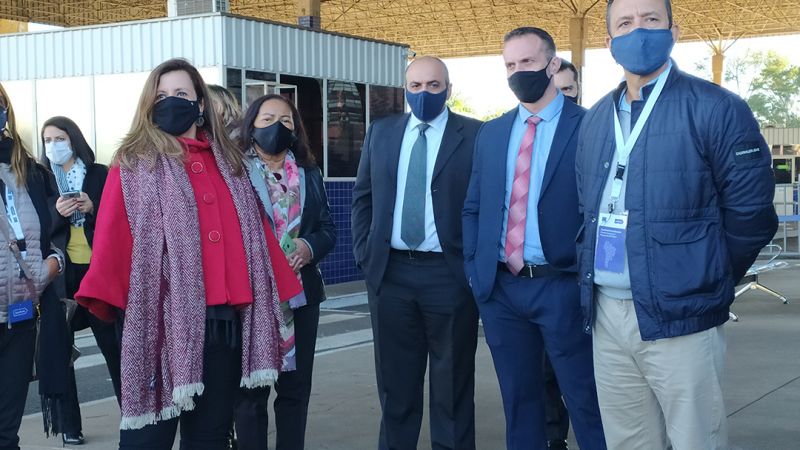News
From 26 July to 2 August, Paraguay and Brazil border management experts from the EUROFRONT-Component 1 programme. The host authorities highlighted the importance of this European Union-financed cooperation programme as support for state entities specialised in security and the fight against transnational crime in the Triple Frontier region.

The visit began in Asunción, Paraguay, where the EUROFRONT team held meetings with authorities from the National Anti-Drug Secretariat (SENAD), the Ministry of Foreign Affairs, the Ministry of the Interior, the National Migration Directorate, the National Police and the National Customs Directorate. Later, the mission went to Ciudad del Este to learn about the work at the border post.
After the visit, the Minister Cynthia Filártiga Lacroix, Director of International Cooperation at the Paraguayan Ministry of Foreign Affairs, underlined the importance of EUROFRONT as it provides “support for State entities responsible for security and the fight against transnational crime to achieve their objectives, specifically for more efficient comprehensive management in the Triple Border region and for the fight against Trafficking in Persons.” She also referred to the European Union as “one of Paraguay's main development partners” and recalled the main axes of the programme applied to the region: “institutional strengthening, training of officials, generation of tools and policies that improve border management procedures and optimise results.”
Dr. Zully Rolón, Minister Executive Secretary of Paraguay’s National Anti-Drug Secretariat, used Twitter to underline the honour it has been for the National Anti-Drug Secretariat to receive EUROFRONT experts and to continue strengthening the cooperation ties that are so important for the fight against cross-border organised crime.
The visit continued on the other side of the Friendship Bridge in Foz de Iguazú, Brazil, where meetings were held with the Federal Police, the Federal Customs, the Federal Highway Police, the Brazilian Intelligence Agency and the Secretariat of Integrated Operations. The team also visited the CIOF (Integrated Centre for Border Operations), learning in detail how the Tripartite Command and the VIGIA programme operates.
Georgia Diogo, Head of the Special International Advisory of the Ministry of Justice and Public Security, said that “the fact-finding visit to Foz do Iguaçu has allowed project coordinators to gain an in-depth knowledge of our realities and the mechanisms already implemented in the country to make future actions more effective.”
The mission ended on 2 August in Brasilia with a visit to the Office of Institutional Security of the Presidency of the Republic to learn about the Integrated Border Protection programme (PPIF) and a meeting at the Ministry of Justice and Public Security attended by representatives of national institutions with responsibility for border management. This dialogue has made it possible to present the main conclusions of the visit and lay the foundations for the definition and development of a joint action plan within the framework of the EUROFRONT-Component 1 programme.
RESULTS OF THE VISIT IN THE WORDS OF THE EUROFRONT TEAM
For José Antonio Cambronero, the director of one element of this programme, “the technical visit to Paraguay and Brazil has strengthened the dialogue with the national authorities linked to managing the Triple Frontier”. He concluded by saying that “the exchange held during the visit has made it possible to jointly identify issues that will become strategic lines of work”.
For Chiara M. Paolucci, main expert prosecutor of Pillar 1 on the part of IILA, “the technical visit to Paraguay has confirmed the existence of a shared awareness with national institutions about the importance of international cooperation and the exchange of best practices to efficiently and securely manage borders.” Regarding the regulatory sphere, an area in which the main action of IILA in the programme is focused, Chiara said that she has identified proposals of interest both at the national level – in the coordination between different organisations – and at the international level, “with special attention to bilateral agreements with bordering countries and multilateral cooperation agreements within the framework of MERCOSUR”.
For her part, Natalia Maciel, coordinator of programmes at IOM, underlined the importance of this visit in order to “get to know everything that Paraguay and Brazil are doing in border management and how the EUROFRONT programme can join these efforts.”
With the information exchanged with the national institutions throughout the visit, Cambronero points out that “the programme will promote a phase of design and development of activities adapted to the Triple Border that will constitute a decisive advance in the search for greater security and efficiency in the management of the border posts visited.”
CONTINUITY OF THE MISSION IN THE MEDIUM TERM
This first visit marks the beginning of the mission of Catia Marinangeli, Border Expert of the EUROFRONT programme, specifically assigned to the Triple Border in the medium term. Over the next few days and together with the institutions, Marinangeli will learn about and analyse the performance of the border posts in the field, paying attention to the challenges and needs of the partner countries.
After the analysis, the Border Expert will carry out a preliminary diagnosis that will serve as a basis for EUROFRONT to define priority activities in the different areas of intervention of the programme: regulations, operations, training and technological training at border posts. The long-term aim is to share European knowledge on border management by working with partner countries to select those European practices that could be adapted and be of special interest and usefulness in the Triple Frontier region.
Line of action
Social media news

